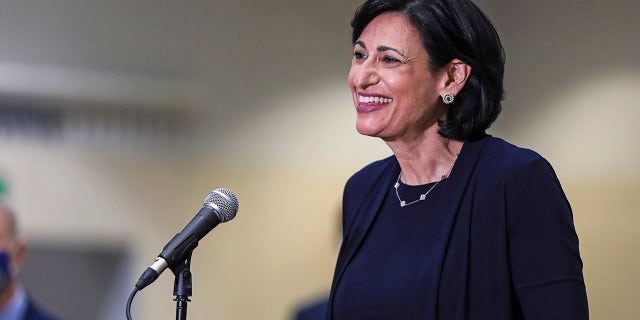Home » Health News »
CDC Director Rochelle Walensky explains what you need to know about COVID vaccines, boosters and more

CDC greenlights ‘mix-and-match’ COVID boosters
CDC director Dr. Rochelle Walensky provides the latest update in the ongoing coronavirus pandemic.
EXCLUSIVE: Centers for Disease Control and Prevention Director Rochelle Walensky, in an exclusive Q&A with Fox News, said she “strongly” encourages those who have not yet received a COVID-19 vaccine do so, saying vaccination “continues to be the best way to protect ourselves, our families and our communities from COVID-19,” while encouraging those who are eligible to receive a vaccine booster to maintain “strong protection.”
The Food and Drug Administration and the CDC have authorized and recommended the use of booster shots of Pfizer-BioNtech, Moderna and Johnson & Johnson vaccines for certain groups.
The FDA also signed off on “mixing and matching” of vaccines, which allows, for example, some individuals who received the Johnson & Johnson vaccine initially to choose to receive a booster shot of either Pfizer of Moderna.
And earlier this month the FDA and CDC authorized and recommended doses of the Pfizer vaccine for children between the ages of 5 and 11.
Walensky broke down what you need to know:
Many vaccinated adults are confused as to whether or not they should receive a booster. Can you explain who is eligible for a booster for each shot?
Walensky: For those who received a Johnson & Johnson vaccine, all people 18 and older who were vaccinated 2 or more months ago are eligible for a booster shot. For those who received the Pfizer or Moderna vaccine, there are several groups of people who are eligible for a booster shot 6 months or more after their primary series. These groups include those who are 65 years and older, 18 years and older who have underlying medical conditions, 18 and older who live in long-term care settings, as well as those 18 and older who live or work in high-risk settings. If you’re 6 months after your second Pfizer or Moderna vaccine, and are in one of these groups you are eligible for a booster.”
Do you recommend that those eligible receive a booster shot?
Walenksy: Vaccination continues to be the best way to protect ourselves, our families, and our communities from COVID-19. I cannot emphasize the importance of vaccination enough. I strongly recommend those who are eligible to receive a booster based on CDC recommendations get one.
Why did your advisory panel choose not to recommend the Pfizer booster shot for many adults? What would you say to critics who’d say the panel was “following the science”? Do you have full faith in your advisory panel?
Walenksy: The CDC Advisory Committee on Immunization Practices has among its members world-renowned scientists and medical professionals. As new data and science has emerged throughout this pandemic, this committee has continually met to put forward their individual and collective expertise and thoroughly discuss scientific evidence. I am confident in the advice and counsel they provide to the agency on matters related to the use of approved vaccines.

CDC Director Dr. Rochelle Walensky speaks to the press after visiting the Hynes Convention Center FEMA Mass Vaccination Site on March 30, 2021, in Boston, Massachusetts.
(Erin Clark-Pool/Getty Images)
The FDA and CDC have discussed “mix and match” boosters for some adults who received the Johnson & Johnson vaccine, meaning they can now receive a Pfizer or Moderna shot. Have there been clinical trials related to this new recommendation? Have there been any side effects for patients mixing and matching vaccines?
Walensky: Some people may have a preference for the vaccine type that they originally received, because they did well with their initial series, while some may desire another. FDA’s authorizations and CDC’s recommendations allow for mix and match between the primary vaccine series and the booster shot. The most important aspect is receiving the strong protection the vaccines offer.

Do you have a message to those who are still hesitant to receive any COVID vaccines?
Walensky: All three COVID-19 vaccines authorized in the United States are safe. They are all proven to be highly effective in reducing the risk of severe disease, hospitalization, and death. If you have not yet been vaccinated, I strongly encourage you to consider the benefits of receiving a COVID-19 vaccine and to get vaccinated– not just for yourself, but also for the health and safety of your children, family, and community.
For those who are still unsure about getting vaccinated talk to a health professional you trust—ask question of your own doctor, pharmacist, or vaccinators in your community to get the information you need.
Will children who’ve received shots be required to wear masks in schools?
Walensky: Our highest priority is to ensure that children can have a safe, in person school year this year. It is proven that masks in schools work to protect our children, to keep them and their school communities safe, and to keep them in school for in-person learning, especially as large numbers of children remain unvaccinated. As we continue to vaccinate more children and adults, schools should continue to utilize the prevention measures that we know keep children safe, such as wearing masks in schools and indoor spaces, avoiding crowds and poorly ventilated spaces, and regularly washing hands. We will continue to follow evolving science, vaccination status and case rates as we provide recommendations to keep our schools safe.
Are any specific members of the Biden administration directing the CDC on how to make and enact any policies on battling COVID-19?
Walensky: We are collaborating across the whole of government and across the scientific and medical community to stay ahead of the virus and move us forward on our path out of this pandemic – to stop the spread of infection, to keep people out of the hospital, and to save as many lives as possible.
Source: Read Full Article


